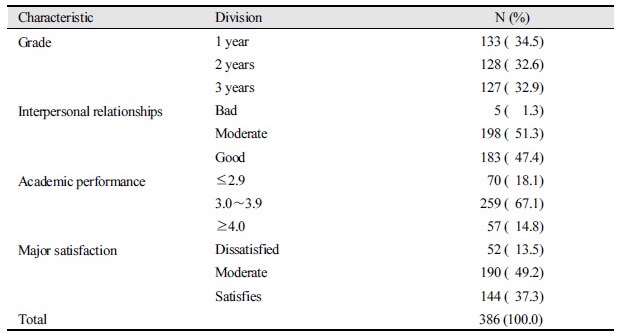Abstract
Objectives: The purpose of the study was to investigate the correlation between critical thinking and problem-solving abilities in dental hygiene students. Methods: This is a cross-sectional study. A self-reported questionnaire was completed by 386 dental hygiene students enrolled in Gwangju Health university from August 30, 2017 to September 2, 2017. The general characteristics of the subjects, their critical thinking and problem-solving abilities were measured for the study. The tool to measure critical thinking was adapted from Yoon which had a Cronbach’ alpha of 0.77. The tool for problem-solving ability was adapted from that used in Heppner & Petersen, which had a Cronbach’ alpha of 0.77. The collected data are analyzed using ANOVA, Pearson’s Correlation analysis, and multiple regression using SPSS/Win 18.0 program. Results: The results show that critical thinking scored 3.45 while problem solving ability scored 3.20. The correlation between critical thinking and problem-solving abilities was found to be strong. The strongest positive correlation in problem-solving ability was critical thinking (p<0.001). The multiple regression analysis suggests that the factors affecting problem solving ability of the subjects was statistically significant. The significant variables included critical thinking (β=0.440) (p<0.001), satisfaction with one’s major (β=0.108) (p<0.05), interpersonal relationships (β=0.104) (p<0.05) and academic performance (β= 0.086) (p<0.05) with an explanatory power of 38.3%. Conclusions: It is necessary to develop a curriculum and learning method for critical thinking and problem-solving abilities in the dental hygiene students.
Acknowledgements
이 논문은 2016년도 광주보건대학교 교내연구비 지원에 의하여 연구된 것임(과제번호 3016005).
Figures & Tables

Table 1. General and major characteristics of subjects


